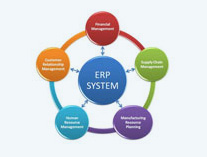ERP Technology Consulting & Solutions
ERP allows a considerable amount of integration between different divisions of the business, such as, marketing, accounting, purchase, and warehousing. With the implementation of ERP systems becoming more and more complex, companies are considering end-to-end ERP outsourcing as the best way to unleash the power of an ERP system, to obtain maximum functionality with minimum risk. ERP systems can be notoriously complex, and installing the software often force companies to change internal processes.Vinculum provides customized ERP solutions addressing the specific need of a company.
Implementation
The implementation of an ERP system involves a complex set of tasks, from system selection and design, to installation and tuning, to maintenance and upgrades. The core set of technologies and capabilities needed to accomplish these tasks is not often obtainable in-house, due to high costs and lack of resources.Companies are still able to implement and maintain a strategic ERP system while controlling costs by outsourcing the development expertise. The benefits of ERP system outsourcing can be enormous, depending on the company, its business model, and the scope of its internal IT requirements and budget
Vinculum and ERP
Vinculum provides customized ERP solutions by working in close association with our clients and mastering their business processes. This helps us to identify and prioritize information requirements, channel information flow, and formulate an effective implementation strategy. The ERP system is implemented within the timeframe specified by our team, with increasing efficiency and performance as our goals.Vinculum ERP services help integrate business processes and reduce cycle times, resulting in increased productivity. The applications that ERP systems are designed to support include: Electronic Commerce, Customer Relationship Management, Supply Chain Management, Human Resource Management, and Business Intelligence as the system's backbone.
An overview of ERP areas
- Control Management (Cost Elements, Cost Center Accounting, Cost Distribution, Activity Based Accounting, Product Cost Accounting, Profitability Analysis)
- Financial Management (General Ledger, Accounts Receivable, Accounts Payable, Financial Controlling, Financial Asset Management, Consolidation)
- Human Resources Management (Time Management, Workforce Planning, Personnel Planning)
- Material Management (Materials Requirements Planning, Purchasing, Inventory Management, Material Evaluation, Invoicing, Warehouse Management)
- Project System Management (Project Time Planning, Project Cost Planning, Capacity Requirement)
- Production Planning Management (Chain Management, Quality Management, Sales and Operations, Materials Requirement Planning, Capacity Requirements Planning, Production Orders, Product Costing, Capacity Load Analysis, Resource Selection and Resource Network)
- Sales And Distribution Management (Business Transactions, Sales Support, Sales Shipping, Billing)
- Treasury Management (Investment Management, Cash Management, Funds Management)
Application Areas
Web-based applications and telecommunications allow virtually seamless, almost real-time integration with suppliers, vendors and even customers. With increased competition and the broad acceptance of technology as a business driver, IT investments must include components that will either immediately or eventually embrace new, and innovative market opportunities.Where should these types of investments be made?
Several IT initiatives stand out. Among the most promising for achieving revenue growth are:
- E-commerce
- Customer-Relationship management
- Supply Chain Management
- Human Resource Management and
- Business Intelligence
E-Commerce
With the advent of the latest in IT innovations, organizations can extend their enterprises by bringing suppliers and vendors into a seamless communication loop of business possibilities. E-commerce makes visible all the supply and demand points across the value chain. When a customer wants a product or service, an online order triggers a series of complex and tightly integrated real-time transactions that fulfill the request, from procurement through manufacturing to shipping.For consumers, round-the-clock access to products and services as well as the power to develop and tailor the products they seek will foster increased customer satisfaction, and in turn, increased retention rates; which brings Vinculum to the next initiative.
Customer-Relationship Management
Customer satisfaction and retention are the only real measures of success. Customer Relationship Management (CRM) systems are designed to bring organizations closer to their customers, to serve them better, anticipate their needs, react more quickly, and focus more on what they value. CRM solutions enable corporations to effectively measure the value of their exchanges with all their business associates.CRM creates a real-time, interactive feedback loop from customers to operations, making it possible to forecast, manage, and meet customer expectations accurately and consistently. Through CRM, an organization manages the entire life cycle of its customer relationships, including marketing analysis and planning, customer acquisition and retention, order management, and customer service and support. Irrespective of whom the customer interacts with, all information is gathered and stored in one central system to give the company the opportunity to serve customers better. This centralized information lets companies better identify new growth opportunities and portray a single image.
Supply Chain Management
Supply Chain Management is defined as managing supply and demand along with ordering, manufacturing, warehousing, inventory-tracking and distribution of a product. By integrating each functional area into a comprehensive strategy, organizations can address the key issues of cost, speed, complexity, flexibility of response, and customer needs.An organization that can provide products and services faster and at lower price is one that best manages its materials, information, cash, and work processes. Supply chain management is a strategic imperative for accomplishing these goals.
Human Resource Management
Handling personnel-related tasks for corporate managers and individual employees. Examples:Human resources administration --Automates personnel management processes including recruitment, business travel and vacation allotments.
Payroll --Handles accounting and preparation of checks related to employee salaries, wages and bonuses.
Self-service HR -- Lets workers change their personal information and benefit allocations online without having to send forms to human resources.
Business Intelligence
Business intelligence helps executives enhance shareholder value by integrating strategic operational and financial data, from both internal and external sources, creating a robust decision-support tool.Information warehouses provide ready access to multiple databases on multiple platforms across the enterprise. With up-to-the-minute facts and figures, executives have a strong foundation on which to base decisions and can use scenario modeling to validate those decisions.
With business intelligence solutions, companies can:
Quickly identify their strengths, pinpoint weaknesses, uncover new opportunities, capitalize on trends, and plan accordingly. They can combine historical and predictive views of their company's performance with information about financial and non-financial drivers of business.The idea is to get the right information to the right people at the right time, as well as the information that matter most--answers backed by collective enterprise fact, not opinion.
Industry Solution
Almost all major vendors of ERP systems are developing or have developed portals as easy-to-use gateways to ERP applications and data for professionals supporting E-business operations. Several vendors are setting up online marketplaces, where businesses can purchase goods. They are also adding supply-chain and web transaction software in a bid to provide across-the-board E-business capabilities.Vinculum and Future Enterprise
Organizations are discovering that ERP solutions are platforms for real growth, the ideal technological backbones for a multitude of applications that can help businesses run more efficiently and harvest that efficiency for growth. The challenge is to invest wisely in software.Vinculum will help you choose the ERP software solution that best meets business' needs; the hardware, from the right servers to the right clients; the bolt-ons that address unique industry issues; and finally, the Internet enabling technologies that can let ERP achieve its fullest potential for the enterprise.
















